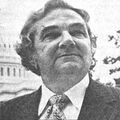File:George E Brown.jpg: Difference between revisions
Siterunner (talk | contribs) No edit summary |
Siterunner (talk | contribs) No edit summary |
||
| Line 22: | Line 22: | ||
[http://www.greenpolicy360.net/mw/images/EPA_History_Xin_Liu-2010.pdf <big>'''''EPA History'''''</big>] | |||
A leader on the House science committee for over 30 years, George legislatively engineered an array of science efforts, including one that greens look to as prescient. | The founding of the EPA was based on new realizations of science and the environment. The vision of the "Whole Earth" that began with unprecedented Apollo photos on the cover of Life magazine in January 1969 led to a coming together of education, students 'teach-ins', scientific space missions studying earth systems for the first time, and popular demands for environmental protections. | ||
A leader and a chairperson on the House science committee for over 30 years, George legislatively engineered an array of science efforts, including one that greens look to as prescient. | |||
When he drafted legislation establishing '''the national climate change research program''' via the [https://www.greenpolicy360.net/w/File:US_Public_Law_95-367.png National Climate Program Act of 1978], the scientific community and nation were beginning to awaken to a new national security threat. I remember his concern, our concern. He was trained as a scientist, an engineer, with an ability to see facts and data sets in a way others could not. | When he drafted legislation establishing '''the national climate change research program''' via the [https://www.greenpolicy360.net/w/File:US_Public_Law_95-367.png National Climate Program Act of 1978], the scientific community and nation were beginning to awaken to a new national security threat. I remember his concern, our concern. He was trained as a scientist, an engineer, with an ability to see facts and data sets in a way others could not. | ||
Representative Brown the Congressperson out in front of "big science". Among his many initiatives, George Brown was a key figure in proposing, establishing, and then saving the [https://landsat.gsfc.nasa.gov/ Landsat program], the [http://www.nytimes.com/1989/03/02/us/last-civilian-photography-satellites-to-shut-down.html uniquely 'open-access' database of Earth Science imaging] when President Reagan attempted to shut Landsat down. Landsat, a model for all the following [https://www.greenpolicy360.net/w/Earth_Science_Research_from_Space earth science research missions from space], is now moving toward its fifth decade with [http://landsat.gsfc.nasa.gov/?p=10391 Landsat 9.] | |||
George's profound accomplishments are especially missed now in the current era as [http://www.greenpolicy360.net/w/Earth_and_Space,_Politics anti-science positioning] in the U.S. Congress threatens national and global security... | George's profound accomplishments are especially missed now in the current era as [http://www.greenpolicy360.net/w/Earth_and_Space,_Politics anti-science positioning] in the U.S. Congress threatens national and global security... | ||
Revision as of 19:07, 26 November 2018
George E. Brown
GreenPolicy Siterunner / SJS: George was looking forward to the 21st century and especially to the challenge of nuclear non-proliferation, his concern for decades. George was a visionary, an engineer, a vet who opposed disastrous war, and a leader in Congress who led from California in shaping the modern environmental movement.
He proposed the first US national climate change study, drafted the legislation and shepherded its passage back in 1978.
In his rumpled suits and quiet way he moved to form coalitions few thought could be formed and garnered support for the first set of U.S. Congressional acts that served as foundation legislation for decades of green progress.
His work advanced environmental air quality and clean air legislation. He introduced the nation's first bill to ban lead in gasoline and was at the forefront of the Clean Air Act. He attacked Los Angeles smog, some of the worst air quality of any city in the world at the time and the air standards that came out of California became models worldwide. He succeeded in clean air and water efforts, though rarely given credit given his quiet approach to accomplishing big picture goals.
George was a key player in legislation founding the Environmental Protection Agency.
As the LA Times noted (without pomp or circumstance) in George's obituary in 1999: "He championed the creation of the federal Environmental Protection Agency". The EPA was in many ways Congressman George Brown's vision achieved..."
The founding of the EPA was based on new realizations of science and the environment. The vision of the "Whole Earth" that began with unprecedented Apollo photos on the cover of Life magazine in January 1969 led to a coming together of education, students 'teach-ins', scientific space missions studying earth systems for the first time, and popular demands for environmental protections.
A leader and a chairperson on the House science committee for over 30 years, George legislatively engineered an array of science efforts, including one that greens look to as prescient.
When he drafted legislation establishing the national climate change research program via the National Climate Program Act of 1978, the scientific community and nation were beginning to awaken to a new national security threat. I remember his concern, our concern. He was trained as a scientist, an engineer, with an ability to see facts and data sets in a way others could not.
Representative Brown the Congressperson out in front of "big science". Among his many initiatives, George Brown was a key figure in proposing, establishing, and then saving the Landsat program, the uniquely 'open-access' database of Earth Science imaging when President Reagan attempted to shut Landsat down. Landsat, a model for all the following earth science research missions from space, is now moving toward its fifth decade with Landsat 9.
George's profound accomplishments are especially missed now in the current era as anti-science positioning in the U.S. Congress threatens national and global security...
George E. Brown Jr. - East LA to 'Planet Citizen'
○
File history
Click on a date/time to view the file as it appeared at that time.
| Date/Time | Thumbnail | Dimensions | User | Comment | |
|---|---|---|---|---|---|
| current | 15:02, 5 December 2014 |  | 200 × 200 (7 KB) | Siterunner (talk | contribs) |
You cannot overwrite this file.
File usage
The following 2 pages use this file:
